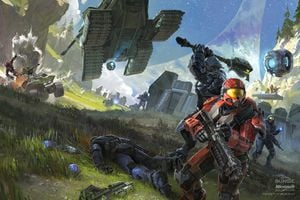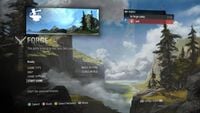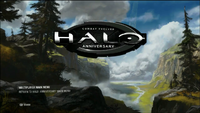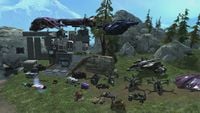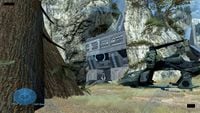Forge/Halo: Reach
From Halopedia, the Halo wiki
Forge returned as a multiplayer gamemode in Halo: Reach, branded as Forge 2.0. The mode was shown off in the Forge World ViDoc as a vast improvement over the mode featured in Halo 3. The mode can also be accessed via the multiplayer component of Halo: Combat Evolved Anniversary, though only maps playable in the Anniversary Map Pack are playable on this disc.
Changes from Forge mode featured in Halo 3
Objects
- All weapons can now be placed on all maps
- The object budget has been increased from $640 to $10,000
- The item hard limit has been increased
- More objects of any one type can be placed down (ex. two Scorpions per map in Halo 3 now upped to eight Scorpions per map)
- Item limits now restricted to a category, rather than individual limits. For example, up to 50 Wall objects can be placed, but this can be any combination of 50 objects within that category as opposed to a set amount of individual objects.
- A vastly improved item palette (see Forge objects in Halo: Reach for a comprehensive list). Many of these objects are based on existing setpieces of Halo multiplayer maps, with players able to place down the bases seen on Blood Gulch or the components that make up Ascension, among others.
Forge filters
Returning from Halo 3 are Forge filters, VFX overlays that help change a map's appearance.
- Colorblind - Available in Classic and Forge 2.0. It makes the map appear in grayscale.
- Next Gen - Available in Forge 2.0 and Classic as Gloomy. It makes the environment have slightly darker colors.
- Juicy - Available in Classic and Forge 2.0. Makes the environment look more vivid, as it increases saturation.
- Nova - Available in Classic and Forge 2.0. Makes the environment look really bright and blurry. Hence the name.
- Olde Timey - Available in Classic and Forge 2.0. Olde Timey makes the entire map appear to be an old movie.
- Pen and Ink - Available in Classic and Forge 2.0. Turns the environment to look as if it was drawn with an ink pen.
- Purple - Available in Forge 2.0 only. It turns the environment purple, thus giving the effect of night.
- Green - Available in Forge 2.0 only. It turns the environment green. Useful for Infection game types, as it makes the environment look scarier.
- Orange - Available in Forge 2.0 only. It turns the environment orange, thus giving the effect of a sunset or a desert-savanna effect.
Object manipulation
Object manipulation in Forge 2.0 has been vastly improved.
- Players have the ability to select the physics of an object: normal, fixed or phased. Normal physics makes an object fall to the ground and interact with the world normally as it does in Halo 3. Fixed physics allows players to place an object and have it stay exactly where it was placed - even floating in the air. Phased physics is similar to fixed, but allows players to intersect objects with other objects or map geometry.
- Players can label most objects, giving the ability to make any part on a map only spawn during a particular game type and allowing more control over player spawning and objectives.
- When an object is being held by a player, that player now "orbits" around the object in their grasp rather than having the object "orbit" around themselves (the camera moves around the object rather than the object around the camera).
- Players can alter the color of some structures and Vehicles to indicate team color. These colours include lights on Forerunner objects, the interior dashboard lights of the Warthog and the paint of the Mongoose.
- Players have the ability to "nudge" pieces, and the ability to edit an object's coordinates in the worldspace, rather than have to manually place objects by eye allowing for smoother and cleaner map design.
- Players have the ability to snap rotate in increments of one, five, ten, fifteen, thirty, forty-five or ninety degrees, allowing for cleaner map design than was possible in Halo 3.
Players can, like Halo 3, share their maps and gametypes with the community via the File Share. However, Reach has upgraded Halo file share functionality.
- At launch, players could gain access to a 24-file limit via the purchasing of Bungie Pro. Following 343 Industries' acquisition of the series, all players now have access to a 25-file limit.
- Players can search for files in-game.
- Players can save searches and gamertags, allowing for easy access to certain files.
Restrictions
Though Forge 2.0 is vastly improved over Classic Forge, there are still a few restrictions on what a player may do to edit a map.
- The Forge budget returns to Halo: Reach, albeit vastly bigger.
- The limit of number of a particular items placeable in Forge mode returns, albeit with some changes. The limit now applies to categories of items; for instance number of walls now applies to walls as a category, with 50 wall objects placable rather than 25 single walls and 25 double walls.
- Forge cannot be used to Forge Firefight or Campaign maps.
- Most items in Forge cost around 10 credits, while large and complex items cost more.
Maps
Following the tradition set by the maps Sandbox and Foundry in Halo 3, Halo: Reach now introduces its own dedicated Forge canvas, Forge World. Unlike any map developed before it, Forge World exists as a map purely dedicated to Forging as a blank canvas. However, upon launch, Forge World was the only map which supported the vast majority of Forge objects and features, with many maps not allowing for most structure or scenery objects to be placed down. The release of the map Tempest in the Noble Map Pack introduced another map to the selection that allowed for Forging and the later release of the seven Anniversary Map Pack maps additionally allowed for more Forge canvases, with Forge variants of each of the seven maps existing to serve as a more accurate replica of the original experience.
For the development of Forge World, developers were inspired by the idea to combine several pre-existing maps into one large map so that players may fly from a Blood Gulch-esque canyon to a rock pillar akin to that of Ascension, with many other locations such as cliffs, islands and interior areas additionally accessible. To assist with this, Reach shipped with several developer-made Forge maps on the disc;
- Forge World
- Asylum - A remake of the Halo 2 map Sanctuary.
- Hemorrhage - a remake of the Halo: Combat Evolved map Blood Gulch.
- Paradiso - A large map built around the island area of Forge World.
- Pinnacle - A remake of the Halo 2 map Ascension.
- The Cage - A map with similar overtones to Halo 2 and Halo 3 maps Lockout and Blackout.
Although none were officially designated as Forge Canvases, the following maps all featured a large amount of features and items available to use in Forge mode unlike the majority of multiplayer maps in the game.
- Noble Map Pack
- Anniversary Map Pack maps - Forge maps available to play via the multiplayer component of Halo: Combat Evolved Anniversary or the associated DLC for Halo: Reach.
- Battle Canyon - a remake of Beaver Creek.
- Penance - a remake of Damnation.
- High Noon - a remake of Hang 'Em High.
- Ridgeline - a remake of Timberland from Halo: Combat Evolved for PC. This map is notable for being the first to allow the placement of foliage in Forge mode.
- Solitary - a remake of Prisoner
- Breakneck - a remake of Headlong.
Glitches
Forge save glitches
Glitch 1: Occasionally and seemingly randomly, one or more of a player's custom maps will fail to save, even when the in-game message "Save Succeeded" pops up after saving a map. Because of this, when the player selects a new map to forge on, the previous map will be, in essence, deleted.
Glitch 2: Occasionally and seemingly randomly, any number of a player's custom maps will be put under another custom map's name, and the original title(s) of the moved map(s) will house a different map(s) (not necessarily a map title that the original map/maps is/are now under). This "shuffling" of maps may result in one or more maps disappearing.
Avoidance
To avoid being a victim of the Forge Save Glitches, it is advisable for players to:
- Choose "Save As New Map" rather than "Save" when saving a freshly-changed map.
- Without selecting a new map in the Forge or Custom Game lobbies, play a custom game; this will ensure that the map is put into a player's Temporary History, and can be accessed from there if the map does get "deleted".
- Upload maps to their Fileshare; if a map is deleted, it can be downloaded from the Fileshare, thereby salvaging the map.
Changes for Halo: The Master Chief Collection
Following the release of Halo: Reach to Halo: The Master Chief Collection a new content update to Halo: Reach's forge be will be added. Referred to as "Thorage", it will be changing forge functionality and the palette from the original version of forge. Some budget restrictions will be changed, allowing more objects to be placed. These changes will be available on the two "official" forge maps - Forge World and Tempest. It will also be adding in new objects to Halo: Reach Forge mode.[1] Specifically the ones listed below.
Additionally, the Forge budget of $10,000 in the Xbox 360 edition of Halo: Reach was be increased for the Xbox One and PC release to $30,000.[2] The update was released along with the PC launch of Halo 3 on July 14, 2020[3]
Implemented objects
A video of the Thorage objects on Tempest can be found here.
GameplayDrivable Vehicles
AmmoMancannons
|
Props
Vehicles and wrecks
|
Trivia
- Forge 2.0 in Halo: Reach was originally going to feature Weather as a changeable object but was cut due to time restraints: "No weather effects in the Forge. Was something we wanted, but something we didn't get to in time." [4]
- In Forge 2.0, if there is lag during a forge session and a player goes into Edit Mode, a Focus Rifle icon will appear for a second and disappear and the reticule will go from Focus Rifle reticule to edit reticule and if your pressing the fire button, the player will emit a short Focus Rifle blast with sound effect for as long as the Focus Rifle reticule is visible. Only that player will see and hear the Focus Rifle blast.
- The Halo: Reach player spawn point object features a holographic Spartan crouching with an M6G pistol aimed forward. The Spartan has a specific armor permutation that includes a variation of the Mark V[B] helmet with UA that was exclusive to Halo: Reach Beta, Mark V right shoulder, CQC left shoulder, Tactical/Tacpad wrist attachment, Tactical/Trauma Kit utility on the right thigh, and FJ/PARA knee guards.
- The initial spawn points in Halo 4 use the same Spartan hologram model as the initial spawn holograms previously used in Halo: Reach.
